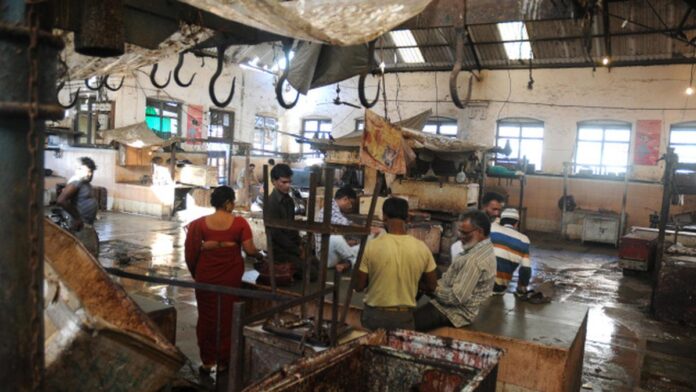Azib Ahmed, TwoCircles.net
Mumbai: On a hot and humid July afternoon in Jalna, 25-year-old licensed cattle trader Sadiq Qureshi sits beside his idle truck and eyes scanning the empty roads. There are no buffaloes to transport and deals to strike. His phone has not rung in days. Business is dead, and so is the trust he once had in the system.
“We have not bought or sold buffaloes since July 11. I have lost Rs 4-5 lakh already. We are left with no option,” he says. The weight in his voice is heavier than the silence that follows.
The Qureshi community (butchers by profession) across Maharashtra has been on an indefinite boycott of buffalo and bull trading for the past one month. What began as a desperate cry for help on July 1 has since grown into a state-wide protest by July 22. The agitation has spread across districts and disrupted the very spine of Maharashtra’s meat supply chain.
They argue that their protest is a stand for dignity, safety and the right to work without fear. The community is demanding protection from vigilante violence, alleged police harassment and suffocating fear that now shadows every trip to the cattle market. At the centre of it all is a rising tide of aggression from self-styled gau rakshaks (cow vigilante), who routinely intercept, assault and shame traders engaged in the legal transport and sale of buffaloes.
“The harassment from the ‘gau rakshaks’ and even police has become unbearable. The cops file cases against us falsely claiming overloading. I was fined Rs 20,000 even when my vehicles were not overloaded. This is no coincidence. Without mincing words, I can say this is targeting because we are Muslim,” he says and recounts instances where mobs allegedly seized animals, beat traders and recorded humiliating videos.
Siraj Qureshi, Maharashtra vice president of the All India Jamiatul Quresh, echoes him, “Our occupation is legal. The government issues us license to do it. Still, we are treated like criminals. Instead of protecting us, the police often aid the vigilantes by confiscating our animals and registering false FIRs.”
Ahmed Noor, a community leader in Jalna, says fear has overtaken every aspect of their work.
“The police do not return the animals they seize. We have to first face vigilantes and then the police,” he says, confirming that many traders have now completely stopped transporting the cattle.
This growing storm pushed Mohammad Arif Qureshi, the Maharashtra president of All India Jamiatul Quresh, to launch the protest. “The government has been lenient toward cow vigilantes. We will not resume trade until our demands are met,” he says, with his stance firm.
As buffalo trading stalls, the ripple effect has begun to show up. Buffalo meat exporting companies have shuttered, workers have lost jobs and farmers are left stranded with unsold livestock.
“Our factory has been shut since July 11. Labourers are suffering. We support the Qureshi community’s stand,” says Mujahid Shaikh, manager at Al Quresh Exports Pvt. Ltd. in Aurangabad.
Rizwan Qureshi, who runs Al-Faiz Enterprises in Malegaon, says, “This is the first time we have had to close our company. The Qureshi community has asked us not to accept supply, and we have complied. We are incurring heavy losses.”
Juned Qureshi, a 35-year-old butcher from Akot, finds no end to alleged harassment. “I have had two cases, one was slapped in 2016 and the other in 2023. The police seize animals and ask for money. We are doing everything legally but still live in fear,” he alleged.
The roots of this chaos stretch back to 2015, when an amendment to the Maharashtra Animal Preservation Act banned the slaughter of cows, bulls and bullocks, while allowing buffalo slaughter under strict regulations. But even that legality offers no shield, say members of the Qureshi community.
Aqif Qureshi, a lawyer from Aurangabad, explains, “Under Section 5A (of the amended law), there is no restriction on buffalo transport within the state. Still, cow vigilantes and police act unlawfully. Even when cases are cleared, animals are not returned.”
He adds that each animal costs Rs 200 daily in Gaushala maintenance and that vigilantes often keep them illegally. “All Qureshis carry proper licenses and market receipts, but they are still hounded,” he alleges.
The crisis is not limited to the Qureshis. Farmers, too, are suffering. In Buldhana, 40-year-old farmer and trader Pralad Shelke explains the financial blow.
“Earlier I sold buffaloes for Rs 80,000; now I am forced to sell them at Rs 70,000 or less. Most markets are shut or empty because Qureshis have stopped buying. We spend around Rs 2,000 just to take one buffalo to market. Now there is no one to sell to,” he says.
Despite the economic collapse and human cost, the response from the state has been minimal. Community leaders allege that only verbal assurances have come from officials, there is no formal action, no circulars and no protection on the ground.
What remains is a growing silence in markets once bustling with trade. Empty trucks line the roadsides. Families sit without income. And a community waits for justice as well as for the basic right to live and work without fear.


